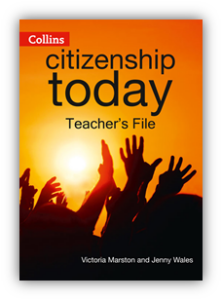Citizenship teachers are no strangers to change. Our lessons empower students to change local communities for the better. Our assemblies sow the seeds of change in terms of global issues. Political U-turns mean that we regularly change schemes of work in line with current affairs. Congratulations, then, oh seasoned ambassador for change, on changing the world one bottom set Year 11 at a time! If only you had the mental energy left to get to grips with the changes to Edexcel GCSE Citizenship Studies…
As it’s that exhausting time of the year when information must be jargon-free, let’s keep things simple here. You need three questions answering: (1) what has changed, (2) what hasn’t changed and (3) what’s relevant to my planning?
What has changed?
The previous four-unit structure has been replaced by five key themes. The new Theme E ‘Taking Citizenship Action’ (six subsections) is now only worth 15% of the overall qualification – contrasting with the larger 30% chunk in the former Unit 4 ‘Citizenship Campaign’. Other changes include a bigger focus on the 2010 Equality Act and on the extension of voting rights to under-18s. In addition, sustainability plays a much smaller role than in the 2009 spec.
What hasn’t changed?
Many components of the 2009 spec have made the cut for the 2016 version. The Commonwealth, MEPs, civil and criminal law, the changing nature of UK society and parliamentary democracy are here to stay for the new exam.
What’s relevant to my planning?
Many of your existing lesson plans will still serve you well. Your previous Unit 1, Theme 1 work (‘Rights and Responsibilities’) can be adapted for the new spec’s Theme A (‘Living Together in the UK’). In the same way, your previous Unit 1, Theme 2 resources (‘Power, Politics and the Media’) can be revamped for the new theme D (‘Power and Influence’).
So, whichever debates get your pupils hot under the collar – and however they best learn – the new spec has something for everyone. This up-to-date qualification doesn’t shy away from sensitive discussion about the tragedy of terrorism. It provides a safe and meaningful context in which to address topics that enrage and frighten us all. It promotes social media and digital democracy. It celebrates equality in ways that other subjects don’t.
Now, given that you’ve now dedicated at least two minutes to this blog, your mind wandered from long-term planning to your summer holiday plans about, what…90 seconds ago? The great news is that you can afford to daydream a little longer today. After all, Citizenship Today and the accompanying Teacher’s File will do 99% of the work for you for September’s Citizenship lessons – all the way through till exam day. What’s more, every term there will be three new lesson plans online at Collins.co.uk. These will reflect the latest current affairs issues that your students are texting each other about.
Sounds like you’ll have extra time this winter to get 2017’s summer holiday booked!
Victoria Marston is the author of Citizenship Today. Find out more about the course here




